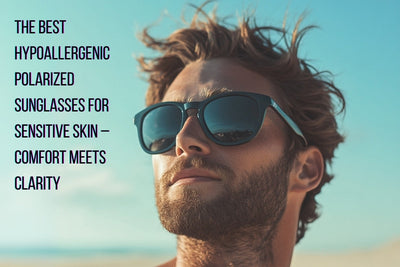Best Hypoallergenic Sunglasses for Sensitive Skin with Polarized Lenses
By Ben Saperia
Updated: July 21, 2025
I didn’t set out to solve a skin sensitivity issue. I just wanted a pair of sunglasses that were light, flexible, and didn’t feel like a burden on my face. That’s what led me to TR90—and it turned out to be one of the best product decisions I’ve ever made.
The first time I wore TR90 frames, I remember being surprised by how comfortable they felt. No pressure across the bridge of my nose, even during long dog walks or outdoor workouts where sweat usually makes discomfort worse. I later learned that TR90 isn’t just light and flexible—it’s also hypoallergenic. That wasn’t the reason I chose it, but it’s become one of the main reasons our customers stick with it.
If you’ve never had issues with your sunglasses, great—you might not need to think about frame material. But if your glasses leave pressure marks, feel too heavy, or cause your skin to itch or sting, switching to a TR90 or acetate frame could change your experience completely. In this guide, I’ll walk through what makes a frame truly hypoallergenic, why it matters more than most people realize, and how polarization ties in to complete the package.

What Makes Sunglasses Hypoallergenic?
Hypoallergenic sunglasses are designed to avoid causing irritation to the skin. That means using materials that are free of common allergens—especially nickel and low-grade plastic blends that can trigger itching, redness, or even rashes. But it’s not just about what they leave out. It’s about how they feel when you wear them all day.
Here's what to know about TR90, a Swiss-engineered thermoplastic:
- Feather-light – You forget you’re even wearing them.
- Flexible – They bend gently instead of snapping under pressure.
- Non-reactive – BPA-free and nickel-free for sensitive skin.
We also use acetate frames in some of our larger styles, like the 165mm Refined Gent sunglasses for large heads. Acetate is another skin-safe, plant-based material used in high-end eyewear, known for its smooth finish and durable construction.
Why Comfort Matters More Than You Think
Many people don’t realize how much discomfort they’re tolerating—until they try something better. It might start as a little pressure on the nose bridge or ears. Then it becomes red marks. Then it becomes a reason to take your sunglasses off halfway through the day.
If any of this sounds familiar, it’s worth reconsidering the material your sunglasses are made from. TR90 and acetate offer all-day comfort without compromise. One customer recently told us, “I used to think sunglasses just weren’t for me. Then I tried yours, and I wear them from morning until sun down.”
This isn’t about style versus function—it’s about both. Sunglasses that look good *and* feel good are worth holding onto.
Bonus Benefit: Why Polarized Lenses Still Matter
Comfort starts with the frame, but clarity comes from the lens. That’s why all of our hypoallergenic sunglasses also feature polarized lenses. These lenses reduce glare by filtering out harsh horizontal light waves—the kind that bounces off water, roads, or car hoods in traffic.
- Less squinting – Especially helpful on bright days.
- Better visibility – Ideal for driving, walking near water, or high-glare environments.
- Less eye strain – Makes long outdoor days more pleasant.
Some people worry that polarization interferes with depth perception in sports like golf. I’ve never personally had that issue—and most of our customers say it improves their experience overall. For sensitive eyes and bright environments, it’s a small upgrade that makes a big impact.
Our Recommended Hypoallergenic Picks
- Best Polarized Sunglasses for Men and Women – TR90, UV400, lightweight, and flexible.
- 165mm Big Head Sunglasses – Acetate frame, wide fit, made for comfort and durability.
- 165mm Refined Gent – Acetate frame, hypoallergenic, classic look for large heads.
If you’re not sure which size fits best, check our Fitting Guide for help finding the perfect frame width and temple length for your head shape.

How to Clean and Store Hypoallergenic Sunglasses
Cleaning Tips
- Use a microfiber cloth – Paper towels can scratch the lenses.
- Stick to mild soap and lukewarm water – Avoid harsh chemicals.
- Rinse after workouts – Sweat can wear down the lens coating over time.
Storage Advice
- Keep them in a protective case – Especially in bags or cars.
- Never leave them on a hot dashboard – TR90 is strong but not heatproof.
- Avoid storing them face-down – Even polarized lenses can get scratched.

Frequently Asked Questions About Hypoallergenic Sunglasses
1. What are the best materials for hypoallergenic sunglasses?
TR90 and acetate are two of the most reliable materials. They’re nickel-free, BPA-free, and designed to avoid causing skin irritation, even after long hours of wear.
2. Can I get polarized lenses in hypoallergenic frames?
Yes—all Faded Days polarized sunglasses are available in TR90 or acetate frames, combining comfort for your skin with clarity for your eyes.
3. Will TR90 sunglasses fit securely without squeezing?
TR90 is incredibly flexible, allowing the frame to adapt to your head shape. It provides a snug fit without pressure points, even for larger heads.
Final Thoughts: Comfort You Can Feel, Clarity You Can See
Most people buy sunglasses based on how they look—but if you’ve ever dealt with discomfort, irritation, or fatigue, you know that feel matters just as much as style. Hypoallergenic frames made from TR90 or acetate are a smart upgrade, especially when combined with polarized lenses for daily clarity.
We design each pair with long-term comfort in mind—because sunglasses shouldn’t be something you tolerate. They should be something you forget you’re even wearing.
If you’ve found relief in TR90 or acetate sunglasses, we’d love to hear your story in the comments. It might just help the next person find their perfect fit.

